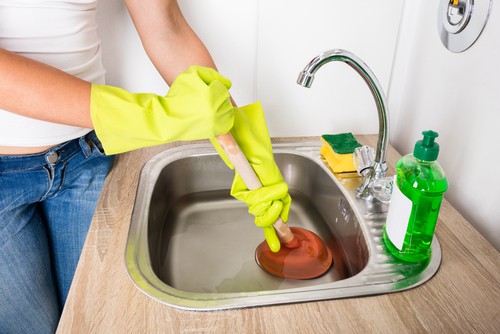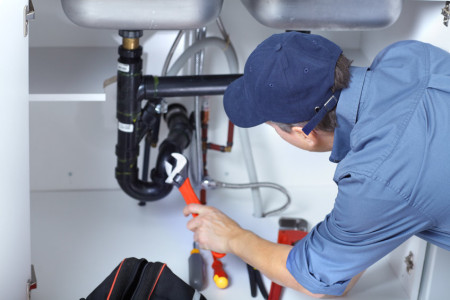Critical Solutions to Follow Until Expert Help Arrives
Critical Solutions to Follow Until Expert Help Arrives
Blog Article
The writer is making several great points relating to Plumbing Emergencies: Tips on What To Do Before overall in the article which follows.

Pipes emergency situations can strike any time, creating stress and potential damage to your home. Whether it's a burst pipeline, a clogged up drainpipe, or a dripping tap, knowing how to manage the circumstance up until a specialist plumbing professional arrives can save you from additional issues. This short article offers essential emergency plumbing tips to aid you alleviate damages and gain back control throughout a plumbing crisis.
Shut off the Water System
The initial step in any type of plumbing emergency is to shut off the water. For local concerns, such as a dripping tap or commode, switch off the shutoff near the component. When it comes to a significant leakage or ruptured pipeline, situate your home's major water shut-off shutoff and transform it off promptly. Recognizing the area of these valves in advance can save important time throughout an emergency situation.
Address Tiny Leaks with Short-term Repairs
Small leaks can quickly come to be substantial troubles if left untreated. Use these temporary fixes till specialist assistance shows up:
While these solutions aren't long-term, they can help decrease water loss and damages.
Unclog Drains Safely
A clogged up drain can be a frustrating and unpleasant problem. Here's just how to tackle it:
If these methods do not work, stay clear of utilizing too much force, as it might intensify the clog.
Manage Overflowing Toilets
An overruning toilet can create immediate disorder. Here's what you must do:
Turn off Your Hot Water Heater
In certain emergencies, such as a ruptured pipeline, it's a good idea to turn off your hot water heater. This prevents overheating or damages to the device when water stops streaming. Switch off the power supply to the water heater (electric or gas) and allow it cool to avoid prospective dangers.
Momentarily Stop a Burst Pipeline
A ruptured pipeline can cause substantial water damage in minutes. To alleviate the concern:
Call a specialist plumbing professional quickly to resolve the trouble completely.
Take Care Of Frozen Piping Meticulously
In colder climates, frozen pipes are a typical emergency. If you presume an icy pipeline:
Avoid Further Damage
Taking quick activity to decrease damages can conserve you money and time over time. Right here's how:
. Have an Emergency Plumbing Package
Prepare a fundamental plumbing emergency kit to handle small problems efficiently. Your kit needs to consist of:
Having these tools accessible can make a substantial distinction in your capability to manage emergency situations.
Know When to Call a Specialist.
While quick fixes can help momentarily, particular plumbing concerns require prompt professional focus. Call a plumbing professional if:.
Quickly contacting a specialist ensures the problem is resolved properly and protects against more problems.
Conclusion.
Pipes emergencies can be frustrating, however with the right expertise and tools, you can take care of the circumstance effectively till help gets here. By shutting off the water supply, attending to tiny leakages, and utilizing momentary fixes, you can decrease damage and maintain your home safe. Remember, these pointers are short-term remedies; always seek advice from a qualified plumbing to take care of the root cause of the trouble. Preparation and fast thinking are your finest allies in any kind of plumbing emergency situation.
Expert Tips for Emergency Plumbing Repairs
Plumbing emergencies can be incredibly stressful and inconvenient. Whether it’s a burst pipe, a clogged drain, or a leaky faucet, these common plumbing emergencies need immediate attention to prevent further damage to your home. But before you panic, it’s important to understand the basics of plumbing repairs and the steps you can take to address these emergencies. In this article, we will share some expert tips to help you navigate through these situations and minimize potential water damage.
Identifying Common Plumbing Emergencies
Leaky pipes and faucets Clogged drains and toilets Burst pipes Low water pressure Water heater problems Essential Tools for Plumbing Repairs
Plunger: Useful for unclogging toilets and drains Adjustable wrench: Needed for tightening or loosening nuts and bolts Pipe wrench: Ideal for gripping and turning pipes Tape measure: Necessary for accurate pipe measurements Plumber’s tape: Helps create watertight seals Understanding Emergency Plumbing Services
Emergency plumbing services are designed to provide immediate assistance for unexpected plumbing issues that can cause significant damage to your home, business, or health. These services are typically available 24/7 and are staffed by experienced plumbers who can quickly diagnose and repair a wide range of plumbing problems.
When a plumbing emergency strikes, time is of the essence. Whether it’s a burst pipe flooding your basement or a gas leak posing a serious risk, emergency plumbing services ensure that help is just a phone call away. These professionals are equipped with the tools and expertise to handle any situation, minimizing damage and restoring your plumbing system to proper working order.
What Constitutes a Plumbing Emergency?
Burst pipes or water supply lines: These can cause extensive water damage and need immediate repair to prevent flooding. Gas leaks or suspected gas leaks: Gas leaks are extremely dangerous and require prompt attention to avoid potential explosions or health hazards. Sewer backups or overflows: These can lead to unsanitary conditions and significant property damage. Clogged drains or toilets causing water to overflow: Overflowing water can damage floors, walls, and other structures. Leaks or water damage causing structural damage: Persistent leaks can weaken the structural integrity of your home or business. No hot water or heating: A lack of hot water can be more than an inconvenience, especially in colder months. Common Causes of Plumbing Emergencies
Aging or corroded pipes: Over time, pipes can deteriorate, leading to leaks or bursts. Improperly installed or maintained plumbing fixtures: Faulty installations or lack of maintenance can result in unexpected failures. Tree roots or other debris infiltrating your sewer line: Roots can grow into pipes, causing blockages and backups. Frozen pipes or water supply lines: In colder climates, pipes can freeze and burst, leading to significant water damage. High water pressure or sudden changes in water pressure: Excessive pressure can strain pipes and fixtures, causing them to fail. Natural disasters such as floods or earthquakes: These events can disrupt your plumbing system and cause severe damage. Steps to Minimize Water Damage
Locate the water shut-off valve: Knowing where the valve is can help you quickly cut off the water supply to the affected area. Turn off the water heater: If there’s a risk of water coming into contact with the heating element, make sure to turn off the water heater to avoid potential accidents. Open faucets and drain pipes: By opening faucets and drain pipes, you can relieve pressure and empty any standing water. Collect and contain water: Use towels, buckets, or bins to collect water and prevent it from spreading to other areas of your home. https://leecountyplumbingandwellservice.com/expert-tips-for-emergency-plumbing-repairs/

I stumbled upon that piece of writing on Expert Tips for Emergency Plumbing Repairs when scouting around the internet. So long as you enjoyed reading our post if you please be sure to share it. I am grateful for your time. Please come by our blog back soon.
Call Today Report this page